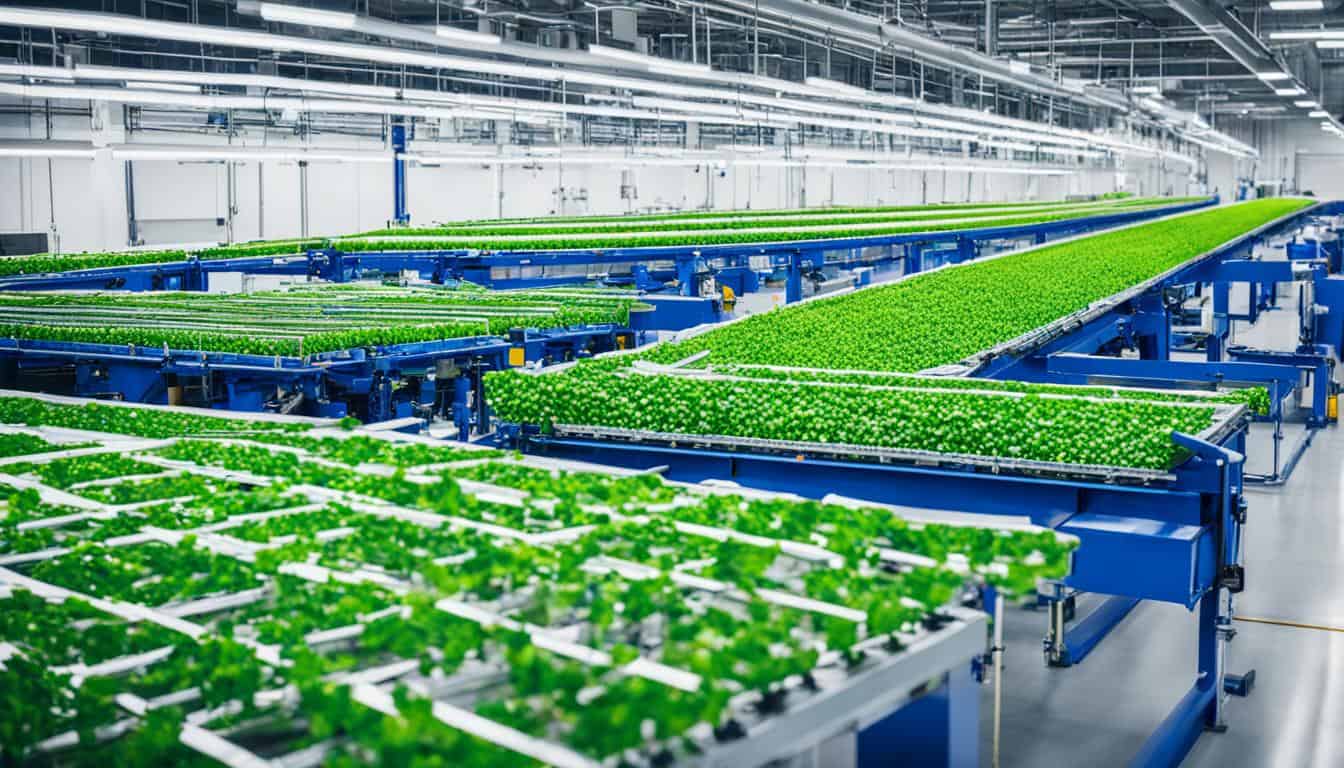In this guide, I’ll be delving into the world of green manufacturing certifications and sustainability certification programs that play a crucial role in fostering eco-friendly manufacturing, sustainable business practices, and environmentally sound products.
Whether you’re a manufacturer, a business owner, or even an everyday consumer, having a working knowledge of these certifications is valuable. They help us make educated choices and ensure adherence to sustainable product standards and environmental standards in the products and businesses we choose to support. So, join me as I explore the key certifications, their significance, and their place in the world of sustainable manufacturing.
Key Takeaways
- Green manufacturing certifications are essential for promoting and maintaining sustainable business practices and eco-friendly products.
- By understanding and adhering to these certifications, businesses can demonstrate their dedication to a greener and more ethical approach to production.
- Awareness of sustainability certifications allows consumers to make informed decisions and support environmentally responsible businesses and products.
- In an era where consumer awareness and regulatory frameworks increasingly favor sustainable methods, these certifications play a vital role in guiding businesses towards a greener future.
- This guide serves as an introduction to the various green manufacturing certifications, including Cradle to Cradle, LEED, and USDA Organic, among others.
The Rising Wave of Consumer Eco-Consciousness in Manufacturing
As consumer eco-consciousness continues to grow, a trend towards sustainability in manufacturing has gained momentum. In recent years, the negative impacts of climate change and the global pandemic have prompted consumers to focus more on environmentally friendly products and sustainable consumption practices. This shift in consumer behavior has led manufacturers to embrace green manufacturing and prioritize transparent, responsible business practices in response to the increasing demand for eco-certifications.
Several factors have contributed to the surge in consumer interest in sustainable products:
- Climate change impact: Natural disasters such as hurricanes, floods, wildfires, and severe storms have raised awareness of the devastating effects of climate change, creating a sense of urgency to adopt more eco-friendly practices.
- Carbon footprint awareness: Consumers are becoming more educated about the carbon footprint of their purchases, including the impact of production, transportation, packaging, and disposal processes. This knowledge has encouraged many to choose products that minimize their overall environmental impact.
- Pandemic-induced lifestyle changes: The COVID-19 pandemic has forced people to evaluate their consumption habits, leading them to prioritize eco-friendliness and sustainability. The increased time spent at home has also highlighted the importance of sustainable living spaces and purchasing decisions.
As these forces drive the demand for environmentally responsible products and practices, the importance of green certifications becomes more evident. Eco certifications, such as LEED, Cradle to Cradle, and Fair Trade, provide an objective standard that companies can adhere to, showcasing their commitment to sustainable manufacturing and environmentally friendly products.
GreenBiz: The ISSP and ACCO certifications are respected programs for sustainability professionals. They demonstrate capability in implementing sustainability strategies across various functions and industries. These certifications are particularly valuable for young professionals or those new to sustainability, highlighting their expertise in this growing field.
Eco certifications serve as a reliable guide for consumers, signaling a manufacturer’s dedication to sustainability and ethical production.
| Certification | Description |
|---|---|
| LEED | Leadership in Energy and Environmental Design (LEED) promotes environmentally responsible green building standards and construction practices. |
| Cradle to Cradle | A certification that assesses products based on criteria such as material health, circular economy principles, and social fairness, promoting continuous improvement and innovation in sustainability. |
| Fair Trade | Ensures that products are manufactured under ethical and sustainable conditions, prioritizing fair wages and the well-being of workers, along with environmental responsibility. |
In conclusion, the rise in consumer eco-consciousness, coupled with an increased focus on sustainability trends and eco certifications, has significantly shaped the manufacturing landscape. This shift towards green manufacturing and sustainable consumption practices signals a positive and necessary change that helps address the growing threats of climate change and carbon emissions.
Certifications vs Company Mission: Striking the Right Balance
Green business certification programs serve as valuable tools for manufacturers aiming to establish credibility and showcase their commitment to environmental sustainability and ethical manufacturing. However, it is crucial for businesses to recognize that certifications are not a substitute for their intrinsic environmental objectives. In this section, we will delve into the significance of striking the right balance between certifications and a company’s genuine sustainability goals.
Why Certifications Don’t Replace Sustainability Goals
Certifications provide a benchmark for sustainability, offering guidance and standards for businesses to adhere to. However, true sustainability extends beyond certifications. Attaining a certification should not be the end goal; it should be viewed as a stepping stone towards holistic sustainability. This approach involves an active commitment to continuously progressive goals that address broader issues, such as:
- Plastic elimination
- Carbon neutrality
- Conservation of ancient forests
Only by embracing a long-term vision that prioritizes the well-being of our planet can a company truly claim to be an environmentally responsible actor. This commitment challenges businesses to think beyond certification vs. mission and focus on integrating sustainability into every aspect of their operations.
“Sustainability requires companies to approach their business differently, thinking in terms of systems and not only individual products or processes.”
Developing Authentic Sustainability Ethos Beyond Certifications
An authentic sustainability ethos is derived from a company’s core values and commitment to environmental stewardship. Instead of solely relying on certifications, manufacturers should engage in introspection to define sustainability objectives that resonate with their mission and reflect a genuine dedication to making tangible, progressive environmental impacts. This involves prioritizing values-driven sustainability to build deeper connections with eco-conscious consumers and foster credibility in their sustainable initiatives.
| Certifications | Company Mission |
|---|---|
| Offer standardized benchmarks for environmental sustainability and ethical manufacturing | Helps define a company’s unique objectives for sustainable growth, impact, and innovation |
| Provide guidelines and tools for achieving sustainability goals | Inspires long-term vision and commitment to holistic environmental stewardship |
| Signify a company’s adherence to industry-recognized sustainability standards | Cultivates trust and credibility with consumers and stakeholders through authentic dedication to sustainability |
Through introspection, continuous improvement, and alignment of certifications with mission-driven environmental goals, businesses can achieve a balance that drives both financial success and long-lasting positive impact on our planet.
Understanding the Eco Passport: Textile Certification Explained

The textile industry has made significant strides towards sustainability by adopting certifications that ensure environmentally friendly fabrics and production methods. The Eco Passport is one such certification that helps maintain apparel sustainability by assessing and certifying textiles and accessories for their eco-friendly properties and absence of harmful substances. Part of the OEKO-TEX suite, the Eco Passport has rapidly gained traction as a reliable textile certification, guaranteeing sustainable textiles and transparency throughout the supply chain.
There are many components involved in the production of textiles, from yarns and dyes to buttons and zippers. To ensure a cleaner and more sustainable apparel industry, all these elements must adhere to stringent health and environmental standards. The Eco Passport certification comprises a comprehensive evaluation system to test and certify these components, giving both manufacturers and consumers the confidence that the products they use or buy are safe and environmentally friendly.
- Restricted Substance List (RSL) screening: This step ensures that raw materials and chemicals used in textiles and accessories do not contain any harmful substances on the RSL set forth by OEKO-TEX.
- Manufacturing Restricted Substances List (MRSL) evaluation: This step confirms that the manufacturing processes and substances used comply with sustainable production guidelines, contributing to environmental conservation and workers’ safety.
By adhering to the Eco Passport certification process, manufacturers not only improve their eco-responsible image but also enhance the overall value of their brand within the industry. This dedication to sustainability appeals to eco-conscious consumers, who value brands that prioritize environmentally friendly practices. In a world where sustainability is increasingly sought after, certifications like the Eco Passport help align manufacturing processes with societal values and environmental responsibility.
“The Eco Passport certification offers peace of mind to consumers, assuring them that their textile products are safe and have a lower environmental impact.”
The Eco Passport certification plays a pivotal role in promoting a cleaner and more sustainable apparel industry by ensuring that textiles and textile accessories are free from harmful substances and produced in an eco-friendly manner. As consumers and manufacturers alike embrace environmentally friendly practices and certifications like the Eco Passport and OEKO-TEX, we move closer to realizing a greener, healthier, and safer textile industry for all.
The Significance of B Corp: A Holistic Approach to Business Sustainability
The B Corp certification is a rigorous and comprehensive program that evaluates the overall impact a company has on the environment, its workers, the community, and its customers. Unlike other certifications that may focus solely on the environmental aspect of sustainability, this certification requires businesses to maintain a viable business model while also championing social justice and ecological health. It represents a paradigm shift in the way organizations approach sustainability and furthers our collective efforts to create a more responsible business landscape.
Comprehensive Impact Assessment: Environment, Workers, and Community
At the core of the B Corp certification is the B Impact Assessment, which evaluates companies on various dimensions, including environmental impact, social equity, and community engagement. By examining a comprehensive range of factors, B Corp challenges organizations to adopt more holistic sustainability policies. Some of these criteria include:
- Implementation of renewable energy practices to reduce carbon emissions
- Efforts to promote diversity and inclusion within the workforce
- Adoption of fair labor practices that ensure worker safety and wellbeing
- Commitment to community engagement through philanthropy and local partnerships
“A company that significantly outperforms other brands is considered a leader in that specific impact area and may receive certification as a B Corporation.”
The B Impact Assessment allows businesses to identify areas for improvement and track their progress while fostering a culture of accountability and transparency.
How B Corp Certification Drives Responsible Business Practices
The B Corp certification doesn’t only set a benchmark for businesses to achieve; it also helps create a supportive community to advocate for systemic change. Companies that earn the B Corp certification formally commit to balancing profit with a higher purpose, reflecting this mission in their governance.
As a result, B Corp certified companies tend to demonstrate more ethical decision-making, robust community investment, and an overarching transparency that signals a strong dedication to their social and environmental goals. Recognizing these benefits, an increasing number of organizations are embracing the B Corp movement to align their strategies with long-term sustainability visions.
- Motivating businesses to adopt responsible practices for long-lasting impact
- Promoting collaboration and knowledge sharing among members to drive positive change
- Encouraging continuous evaluation of progress towards sustainability goals
- Inspiring other organizations to join the movement and contribute to a global shift in responsible business behavior
The B Corp certification is a vital tool for fostering a future where business success is directly linked with responsible practices and social equity. By embracing this holistic approach to sustainability, organizations can lead the charge in creating a more equitable, prosperous, and eco-conscious world.
Certifying Green: The Cradle to Cradle Approach for Sustainable Products

In the quest to create more sustainable products, the Cradle to Cradle Certified (C2C) label has emerged as a symbol of dedication to the circular economy. This certification, which focuses on evaluating products across five crucial categories, advocates for constant improvement and innovation in designing products that are genuinely sustainable and beneficial for both people and the planet.
Products seeking to be Cradle to Cradle Certified are thoroughly assessed for the following aspects:
- Material health
- Reuse and product circularity
- Renewable energy usage
- Water stewardship
- Social fairness
The standards laid out by the certification process enable manufacturers to revisit each aspect of their product lifecycle and fine-tune their processes. By doing so, they eventually achieve superior levels of sustainability and contribute to the circular economy.
“The Cradle to Cradle Certified Product Standard guides designers and manufacturers through a continual improvement process that looks at a product through five quality categories — material health, material reutilization, renewable energy and carbon management, water stewardship, and social fairness.” – Cradle to Cradle Products Innovation Institute
Upon evaluation, products are assigned one of five certification levels ranging from Basic to Platinum. This tiered system not only represents product proficiency in the assessed categories but also encourages manufacturers to constantly aim for higher certifications and attain greater sustainability milestones.
Several recognizable brands that have embraced the C2C philosophy include Herman Miller, a furniture design giant with its Aeron Chair, and ECOR, a global pioneer in circular design and manufacturing with its innovative building materials.
EcoEnclose: Before pursuing certification, it’s important to assess your sustainability goals, values, and how you will measure success. Much of the work in transparency and accountability in your supply chain can be done independently, without a certifying body. Certifications should come after thorough due diligence on your supply chain and product formulation.
In summary, the Cradle to Cradle Certified approach empowers manufacturers to adopt sustainable practices and contribute to a positive impact on the environment, society, and the economy. It helps establish a new paradigm where resources are utilized efficiently, waste is minimized, and products retain their value throughout their lifecycle, ultimately promoting a crucial shift towards a circular economy.
1% for the Planet: Pledging Profits for Environmental Action
One increasingly popular movement that highlights corporate commitment to environmental issues is the 1% for the Planet membership. This initiative encourages businesses to pledge 1% of their annual gross sales to environmental causes, emphasizing their eco-friendly commitment and philanthropic approach to business.
Founded by Patagonia’s Yvon Chouinard and Blue Ribbon Flies’ Craig Mathews, the 1% for the Planet network seeks to create a global alliance dedicated to protecting and preserving the environment. The program covers a broad range of environmental causes, allowing businesses to select the organizations and initiatives they wish to support based on their values and priorities.
The Impact of Contributing 1% Revenue on Environmental Stewardship
“It’s not about giving back a small fraction of profits each year. It’s about being fully committed to being a force for good in the world.” – Kate Williams, CEO of 1% for the Planet
While some corporations might hesitate to allocate a share of their revenue to environmental causes, it’s essential to recognize the long-term benefits of this business philanthropy. The 1% for the Planet initiative has inspired hundreds of companies worldwide to step up and take environmental action. To date, the program has helped direct over $270 million towards approved environmental nonprofit organizations, generating positive impacts across multiple ecological initiatives.
Nurturing a strong environmental stewardship and eco-friendly commitment within the company can also strengthen brand reputation among increasingly conscious consumers. With 1% for the Planet membership, stakeholders, employees, and customers can be assured of a genuine dedication to eco-friendly practices and social responsibility.
- Improved Brand Perception: Companies that join the 1% for the Planet network not only contribute to preserving the environment but are also seen as environmentally responsible by their customers. This positive perception can significantly boost brand reputation and customer loyalty.
- Employee Morale: A core commitment to environmental action, such as corporate giving through 1% for the Planet, can help foster pride and a sense of purpose among employees, translating into higher productivity and job satisfaction.
- Enhanced Industry Collaboration: Through this network of like-minded businesses, members can share knowledge, resources, and best practices, fostering collaboration and innovation in the pursuit of a sustainable future.
Ultimately, the decision to join 1% for the Planet signifies an unwavering commitment to environmental stewardship, which is key to fostering long-term sustainability and success in an increasingly eco-conscious global economy.
From Farm to Fashion: Exploring the Standards of Fair Trade Certifications
Fair Trade certifications play a crucial role in fostering ethical and sustainable practices within the industry. Some of the most prominent Fair Trade certifying organizations include Fair Trade USA and Fairtrade International. Both of these organizations are dedicated to ensuring that products, from textiles to food, are produced following standards that prioritize workers’ well-being, community health, and environmentally sensible land management.
With Fair Trade certifications, companies are encouraged to adopt a more responsible and sustainable approach to their manufacturing processes, ultimately contributing to a more ethical supply chain.
Let’s explore the various Fair Trade certifications and their unique benefits to producers, workers, and the environment:
- Fair Trade USA: A nonprofit organization that focuses on empowering family farmers and workers by providing better wages, housing facilities, and educational opportunities. Their certification ensures that products carrying the Fair Trade Certified label have been ethically produced and sourced.
- Fairtrade International: Known for its globally recognized Fairtrade Mark, this organization sets international standards for working conditions, environmental protection, social equity, and community development in the certified products.
- World Fair Trade Organization (WFTO): An international network of fair trade organizations that verifies and supports fair trade practices through its Guarantee System. The WFTO membership label is a proof of ethical business practices and commitment to social equity.
- Fair for Life: Founded by the Institute for Marketecology (IMO), the Fair for Life certification goes beyond fair trade and aims to improve working conditions and promote environmental sustainability throughout the entire production process.
Each certification has its specific focus, yet all share the same ethos – fostering sustainable agriculture, ethical manufacturing, social equity, and support for eco-conscious apparel.
| Certification | Focus | Benefits |
|---|---|---|
| Fair Trade USA | Empowering family farmers, workers, and communities | Better wages, housing facilities, and educational opportunities |
| Fairtrade International | International fair trade standards | Improved working conditions, environmental protection, and community development |
| World Fair Trade Organization (WFTO) | Verification and support for fair trade practices | Ethical business practices and a commitment to social equity |
| Fair for Life | Improving working conditions and environmental sustainability | Encompasses the entire production process from farm to fashion for fair labor and eco-friendly practices |
To summarize, Fair Trade certifications enable consumers to make informed choices, advocating for ethical practices in industries such as agriculture, textiles, and apparel. Supporting Fair Trade certified products goes a long way to encourage further responsible manufacturing, ultimately contributing to a more equitable and sustainable global economy.
USDA Organic and EU Organic Logo: What Do These Food Certifications Stand For?
USDA Organic and EU Organic Logo certifications play a crucial role in upholding the standards of organic agriculture, ensuring that food products are grown and processed following eco-friendly methods that sustain ecological balance and conservation. By obtaining these certifications for their produce, manufacturers communicate their commitment to responsible and sustainable food systems. But what exactly do these food certifications entail?
Regulating Organic Agriculture: Ensuring Eco-Friendly Food Production
The USDA Organic certification, granted by the United States Department of Agriculture, serves as a guarantee that the food products bearing its seal have been grown and processed according to stringent guidelines defined by the National Organic Program. These guidelines include permissible and prohibited substances and practices that align with the principles of organic agriculture.
Similarly, the EU Organic Logo, also known as the Euro-Leaf, assures consumers that the food products have been produced in compliance with the European Union’s organic regulation. This regulation covers all aspects of organic food production, including crop and livestock management, processing, and labeling, fostering trust among consumers that the food they consume originates from eco-friendly practices.
| Food Certification | Notable Requirements |
|---|---|
| USDA Organic |
|
| EU Organic Logo |
|
Additionally, various organizations such as the Soil Association promote organic agriculture and provide certification services to support sustainable food systems. These organizations actively advocate for eco-friendly food production, lending their weight and expertise to ensuring the organic standards remain stringent and relevant.
Organic agriculture is a production system that sustains the health of soils, ecosystems, and people. It relies on ecological processes, biodiversity, and cycles adapted to local conditions, rather than the use of inputs with adverse effects. – Food and Agriculture Organization (FAO)
In conclusion, the USDA Organic and EU Organic Logo certifications uphold the values of organic agriculture, providing consumers with a reliable marker of eco-friendly food production. By seeking these certifications, manufacturers pledge their allegiance to sustainable food systems and contribute to a healthier and more balanced planet.
LEED: Paving the Way for Green Building and Sustainable Urban Development
Leadership in Energy and Environmental Design (LEED) is a globally recognized certification system that sets the standard for green building practices. Developed by the US Green Building Council, LEED provides a comprehensive framework for creating healthy, efficient, and environmentally responsible structures.
This certification plays a critical role in driving sustainable urban development and facilitating the implementation of green construction best practices. In this section, we will explore the parameters of LEED certification and its impact on the field of environmental design.
LEED Certification Parameters: Advancing Green Construction Best Practices
LEED certification is based on a points system, which evaluates buildings across various categories related to sustainability and environmental performance. The key parameters that determine a building’s LEED score include:
- Sustainable Sites: Protecting ecosystems, promoting biodiversity, and reducing environmental impact during site selection and development.
- Water Efficiency: Optimizing water consumption, reusing rainwater and greywater, and implementing water-efficient landscaping.
- Energy and Atmosphere: Utilizing energy-efficient systems, renewable energy sources, and improving building envelope and ventilation.
- Material and Resources: Emphasizing waste reduction, recycling and reusing materials, and sustainable sourcing of building materials.
- Indoor Environmental Quality: Ensuring optimal indoor air quality, thermal comfort, daylight access, and acoustic performance.
- Innovation in Design: Fostering the adoption of innovative, sustainable design features and green building technologies.
Based on the cumulative score, buildings can achieve four levels of certification: Certified, Silver, Gold, and Platinum. As building owners strive for higher certification levels, they are continually pushed to enhance their environmental performance and sustainability.
“LEED is turning the buildings where we live, work, and play into healthy, efficient spaces that provide a better quality of life for the people who occupy them.”
– Mahesh Ramanujam, President & CEO, U.S. Green Building Council
| LEED Certification Level | Points Required |
|---|---|
| Certified | 40-49 |
| Silver | 50-59 |
| Gold | 60-79 |
| Platinum | 80+ |
In conclusion, LEED certification serves as a beacon for environmental design, setting a high benchmark for green building practices and propelling innovation in sustainable urban development. As more developers and building owners seek LEED certification, the built environment becomes more conducive to fostering healthy communities and a greener, more sustainable future for all.
Conclusion on Product Certification
Throughout this guide, we’ve explored the importance of certifications and standards, which collectively contribute to a more sustainable and responsible manufacturing sector. These certifications act as environmental benchmarks, driving companies to adopt eco-friendly practices while simultaneously educating consumers on the importance of ethical consumerism. As green industry leaders continue to prioritize corporate sustainability, our collective impact on the planet can be significantly diminished.
However, the pursuit of becoming certified sustainable transcends mere adherence to certification programs. Green certification systems serve as essential tools, but authentic sustainability demands a deeper commitment to mission-driven environmental objectives. The journey towards a greener future requires constant evaluation and refinement of company practices, striking a balance between the desire for certifications and genuine, mission-driven environmental goals.
As we collectively strive towards sustainability, it is paramount for companies and consumers alike to stay informed and engaged with environmental best practices in manufacturing. By supporting brands that prioritize ethical consumerism and corporate sustainability, we can collectively empower a greener, brighter future for all.
FAQ on Green Manufacturing Certifications and Standards
Q: What are sustainable manufacturing certifications and standards?
A: Sustainable manufacturing certifications and standards are a set of guidelines and criteria that businesses and manufacturing facilities must adhere to in order to be considered environmentally friendly and sustainable. They cover various aspects including energy use, waste reduction, and ethical sourcing of materials.
Q: What is green business certification?
A: Green business certification is a third-party verification that a company’s operations and products meet specific environmental and sustainability standards. It involves an assessment of the company’s green practices and products to ensure they are eco-friendly and socially responsible.
Q: How does a company obtain green manufacturing certification?
A: To obtain green manufacturing certification, a company must undergo a rigorous assessment by a certification body to ensure that its operations, products, and supply chain adhere to specific sustainable and environmentally friendly standards set by the certification authority.
Q: What is the Rainforest Alliance certification?
A: The Rainforest Alliance certification is a standard that focuses on sustainable agriculture, forestry, and tourism. It is awarded to businesses and products that meet strict criteria for conserving biodiversity and ensuring sustainable livelihoods.
Q: What is the National Green Building Standard (NGBS)?
A: The National Green Building Standard (NGBS) is a rating system developed specifically for green residential construction and remodeling projects. It outlines practices and requirements for designing and constructing sustainable homes and buildings.
Q: What are the types of green product certifications available?
A: There are various types of green product certifications available, including the Green Seal certification, Leaping Bunny certification for cruelty-free products, and certifications for specific eco-friendly products such as cleaning products and energy-efficient appliances.
Q: How do sustainable certifications help companies?
A: Sustainable certifications help companies by showcasing their commitment to environmental responsibility and sustainability. They enhance a company’s reputation, build consumer trust, and open up opportunities to access eco-conscious markets and consumers.
Q: What are the standards for different types of green manufacturing certifications?
A: The standards for different types of green manufacturing certifications cover a wide range of criteria, including energy efficiency, waste reduction, ethical sourcing, supply chain sustainability, and adherence to specific green business practices.
Q: What is the role of supply chain certification in green manufacturing?
A: Supply chain certification in green manufacturing ensures that the entire supply chain, from sourcing raw materials to delivering the final product, meets specific sustainability and environmental standards. It helps companies ensure the sustainability of their entire production process.
Q: Why is it important for a company to achieve a green building certification?
A: It is important for a company to achieve a green building certification as it demonstrates the company’s commitment to sustainable and eco-friendly construction practices. It also signifies that the company’s buildings are designed and constructed to high environmental and energy efficiency standards.





Leave a Reply